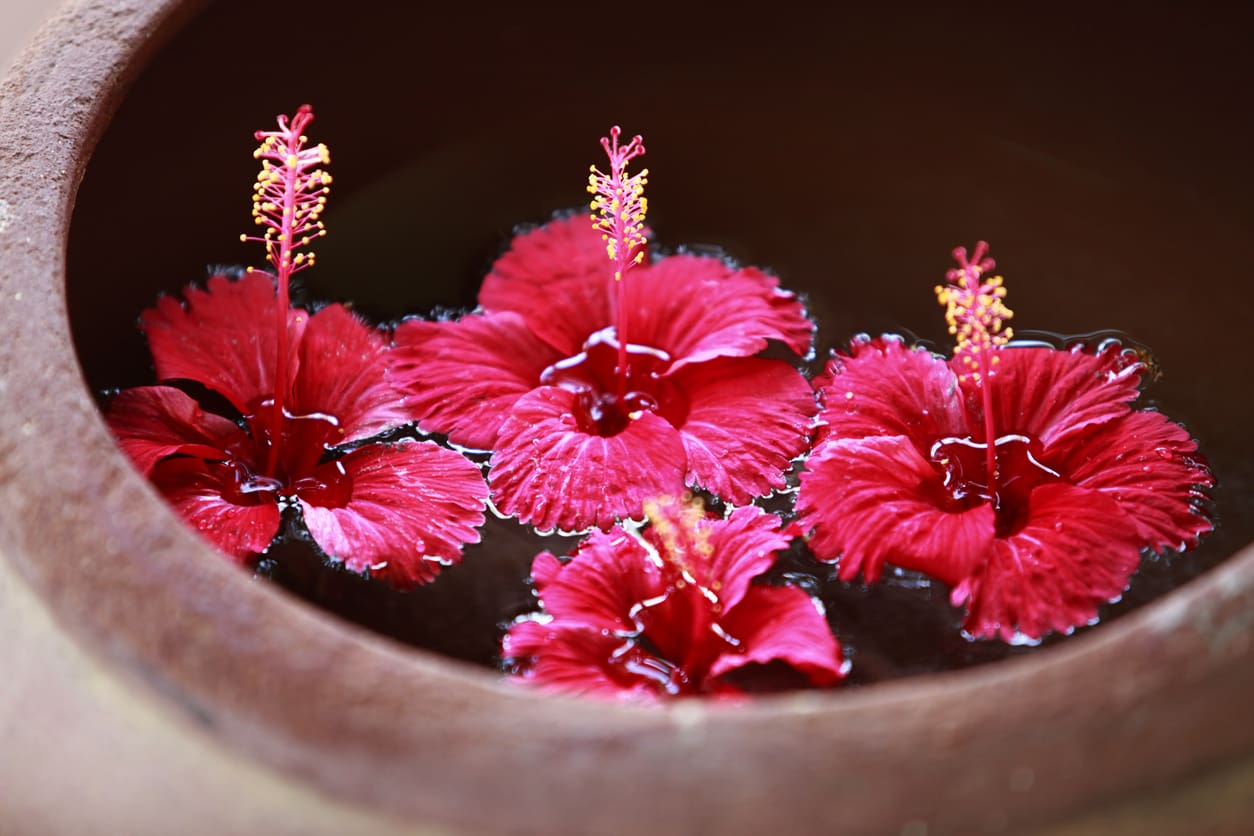What Are The Health Benefits Of Hibiscus?
Did you know hibiscus, a beautiful vibrant flower known for it’s many striking color hues, has been cherished for centuries across various cultures, not merely for its aesthetic appeal but for it’s myriad of amazing health benefits? From ancient traditional remedies to contemporary scientific research, hibiscus has emerged as a potent natural agent promoting health and well-being. But what makes this flower so special? Let’s delve into the health benefits of hibiscus and uncover the science behind it’s popular acclaim.

The Health Benefits Of Hibiscus: A Comprehensive Exploration
Hibiscus Is Rich In Antioxidants
Antioxidants are compounds that neutralize free radicals, unstable molecules that can cause cellular damage. Hibiscus is abundant in antioxidants such as beta-carotene, vitamin C, and anthocyanin. These antioxidants play a crucial role in combating oxidative stress, thereby reducing the risk of chronic diseases like cancer, heart disease, and diabetes. As the saying goes, “An ounce of prevention is worth a pound of cure,” and hibiscus offers that preventive ounce in abundance. See health.clevelandclinic.org for the 7 health benefits of delicious hibiscus tea.
Hibiscus Helps With Blood Pressure Regulation
Hypertension, or high blood pressure, is a silent precursor to many cardiovascular ailments. Studies have shown that hibiscus tea can help lower both systolic and diastolic blood pressure. In one study, participants who consumed hibiscus tea experienced a significant reduction in blood pressure compared to those who took a placebo. This natural approach to managing blood pressure offers a promising alternative or complement to conventional medications. For another natural way to possibly help lower blood pressure see Marneys Tidbits article, “Best Vegan Protein Powder” to learn about the effects of Nitric Oxide.
Hibiscus Helps With Cholesterol Management
Maintaining healthy cholesterol levels is vital for heart health. Some studies suggest that hibiscus tea may help improve blood lipid profiles by increasing high-density lipoprotein (HDL) cholesterol and decreasing low-density lipoprotein (LDL) cholesterol and triglycerides. However, it’s essential to note that research findings are mixed, and more extensive studies are needed to confirm these effects.

Hibiscus Helps With Liver Health
Our liver plays a pivotal role in detoxifying our bodies. Hibiscus has been found to support liver health by reducing markers of liver damage. It’s antioxidant properties help in neutralizing free radicals, thereby promoting optimal liver function. A healthy liver ensures our bodies metabolic processes run smoothly, much like a well-oiled machine.
Hibiscus Contains Anti-Inflammatory And Antibacterial Properties
Chronic inflammation is linked to numerous health issues, including heart disease, asthma, and rheumatoid arthritis. Reducing inflammation proves to be an important part of our health journey which hibiscus can help with. Hibiscus contains anthocyanins, which have demonstrated anti-inflammatory properties. Additionally, some studies have shown that hibiscus extract possesses antibacterial properties, helping to combat infections by inhibiting the growth of certain bacteria.
Hibiscus Helps With Weight Management
In the quest for effective weight management strategies, hibiscus emerges as a natural ally. Some studies have indicated that hibiscus extract may reduce body weight, body fat, and body mass index (BMI). These effects are attributed to hibiscus’s potential to inhibit the production of amylase, an enzyme that breaks down carbohydrates, thereby reducing their absorption. However, it’s important to approach these findings with caution, as more research is needed to fully understand hibiscus’s role in weight management.
Hibiscus Helps With Blood Sugar Control
Hibiscus Is Good For Digestive Health
Hibiscus tea has traditionally been used to improve digestion. It has diuretic properties, which can help increase both urination and bowel movements. This can aid the body’s natural detoxification processes and support overall digestive health.
Hibiscus Is Good Immune System Support
Rich in vitamin C and other antioxidants, hibiscus can bolster the immune system. Regular consumption of hibiscus tea may help fend off common infections and keep the immune system robust. After all, isn’t prevention a better route?
Hibiscus May Promote Sound Mental Health Well-being
The act of sipping a warm cup of hibiscus tea can be a calming ritual, promoting relaxation and mental well-being. While the direct effects of hibiscus on mental health require more research, the indirect benefits of relaxation and stress reduction are undeniable. In a world bustling with constant activity, taking a moment to enjoy hibiscus tea can be a simple yet effective way to practice peacefulness.
Potential Risks And Considerations Of Hibiscus
While hibiscus offers numerous health benefits, it’s essential to be aware of potential risks:
Hibiscus May Cause Blood Pressure Interaction: Individuals with low blood pressure or those on antihypertensive medications should monitor their blood pressure when consuming hibiscus, as it may cause further reductions.

Hibiscus May Not Be Suitable To Consume During Pregnancy: Some studies suggest that hibiscus may have emmenagogue effects, potentially stimulating menstruation. Pregnant women are advised to consult their healthcare provider before consuming hibiscus.
Hibiscus May Cause Allergic Reactions: As with any natural product, some individuals may experience allergic reactions to hibiscus. It’s advisable to start with small amounts to assess tolerance.
FAQ For Hibiscus Health Benefits
Where to buy hibiscus tea?
Hibiscus tea can be found in most grocery stores, health food shops, and specialty tea stores. You can also purchase it online from retailers such as Amazon, and Thrive Market. Ensure you choose a trusted brand such as Traditional Medicinals that offers organic or high-quality hibiscus flowers for the best flavor and health benefits.
When is the best time to drink hibiscus tea?
The best time to drink hibiscus tea depends on your preference. Some people enjoy it as a refreshing beverage in the morning or as an afternoon iced tea due to its tangy, slightly tart taste. Hibiscus tea can also be a relaxing option before bedtime because it is caffeine-free. Additionally, drinking it after meals may support digestion. Always consider your personal health needs or consult with a healthcare professional for the ideal time.
Is hibiscus tea caffeinated?
No, hibiscus tea is naturally caffeine-free. It is made from the dried petals of the hibiscus flower, which does not contain caffeine. This makes it an excellent choice for those seeking a soothing, non-caffeinated beverage. Whether enjoyed hot or cold, hibiscus tea can be a perfect evening drink without worrying about disrupting your sleep.
What are hibiscus flower benefits?
Hibiscus flowers offer several wellness benefits thanks to their rich antioxidant profile, particularly vitamin C and anthocyanins. Drinking hibiscus tea may support heart health by helping lower blood pressure, reduce inflammation, and promote healthy cholesterol levels. It also has mild diuretic and digestive properties, making it a popular choice for natural detox support. Many people enjoy hibiscus for its refreshing flavor and immune-boosting qualities. Always consult your doctor if you take blood pressure or diabetes medications, as hibiscus may interact with certain prescriptions.
What are hibiscus benefits for skin?
Hibiscus is often called the “Botox plant” because its natural acids and antioxidants help brighten, firm, and gently exfoliate the skin. It supports collagen production, improves skin elasticity, and reduces the appearance of fine lines. The plant’s high mucilage content also helps lock in moisture, making it ideal for dry or dull skin. Many skincare products use hibiscus extract to promote a smoother, more radiant complexion. Those with sensitive skin should patch test first, as its exfoliating properties may be too strong for some.
What are hibiscus plant benefits for hair?
Hibiscus is widely used in hair care for its ability to strengthen roots, reduce shedding, and promote healthier growth. The flower and leaves contain amino acids that help nourish the scalp and support keratin production. Hibiscus also adds natural shine, softens strands, and can help reduce dandruff thanks to its antimicrobial properties. Many people use hibiscus-infused oils, masks, or rinses to enhance thickness and improve overall hair health. It’s gentle enough for most hair types, though those with scalp conditions should consult a dermatologist.
Do hummingbirds like hibiscus?
Yes, hummingbirds are attracted to hibiscus flowers, especially those with bright red, orange, or pink blooms. The flowers’ vibrant colors and nectar-rich blooms make them a perfect food source for these tiny birds. To attract hummingbirds to your garden, plant hibiscus varieties with large, tubular flowers. The sweet nectar found in hibiscus is a key part of a hummingbird’s diet.
Is hibiscus toxic to dogs?
Hibiscus plants are generally not considered toxic to dogs. However, while they are non-toxic, ingesting large amounts of any plant material can cause stomach upset in pets. It’s always best to monitor your dog if they are around hibiscus plants. If you notice any signs of discomfort, such as vomiting or diarrhea, consult a veterinarian for advice.
Is a hibiscus an annual or a perennial?
Hibiscus plants can be either annuals or perennials, depending on the climate. In warm climates (USDA zones 9-11), hibiscus is a perennial that comes back year after year. In colder climates, hibiscus is usually grown as an annual, as it can’t survive freezing temperatures. If you want a perennial hibiscus, look for varieties suited to your hardiness zone or bring it indoors during colder months.
Is Epsom salt good for hibiscus plants?
Yes, Epsom salt is beneficial for hibiscus plants. It contains magnesium, which helps with photosynthesis and improves overall plant health. Magnesium can also promote stronger blooms and healthier foliage. Applying Epsom salt to the soil once every few months can help hibiscus plants thrive. Be cautious with the amount used, as excessive salt can cause issues, so a light application is recommended.
How long does hibiscus take to grow from seed?
Hibiscus seeds typically take around 2-4 weeks to germinate when kept in warm, humid conditions. Once sprouted, it can take several months for the plant to grow large enough for transplanting outdoors, especially if starting from seed indoors. Patience is key, as it may take up to 6-9 months for a hibiscus grown from seed to mature and bloom.
Do hibiscus need a lot of water?
Hibiscus plants prefer consistently moist soil but should not be waterlogged. While they do need frequent watering, especially in warmer climates, ensure the soil drains well to prevent root rot. During the growing season, watering deeply once or twice a week is typically sufficient. However, if the plant is in a pot, more frequent watering may be necessary to keep the soil consistently moist.
Marneys Tidbits publishes helpful and insightful, lifestyle related articles. Our hope is, our articles will encourage you to branch out, and try new things, and in doing so, that you’ll experience increased vitality and excitement in your life. Follow us on TikTok, Pinterest, Instagram and Facebook for extra tidbits.











